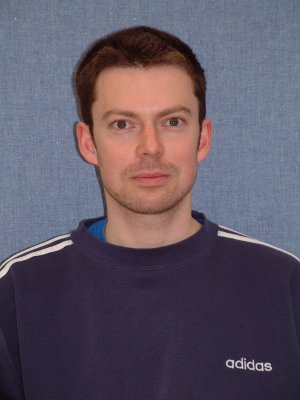 |
Dr. Jacob HurstResearch Student: Learning Classifier Systems Faculty of Computing, Engineering and Mathematical Sciences University of the West of England, Bristol Coldharbour Lane, Bristol BS16 1QY UK Phone: Fax:
|
 |
Dr. Jacob HurstResearch Student: Learning Classifier Systems Faculty of Computing, Engineering and Mathematical Sciences University of the West of England, Bristol Coldharbour Lane, Bristol BS16 1QY UK Phone: Fax:
|
|
Research InterestsMy research have mainly concentrated on the use of learning classifier systems for robotic research. Learning Classifier System could offer huge benefits to robotics as they combine two powerful techniques reinforcement learning and genetic algorithms. There have been only a few successful implementations of LCS on robots, and much of my work has been concentrating on preparing LCS for the challenges of robotic environments. I have been mainly interested in Michigan style classifiers such as ZCS and XCS. The initial aim is to develop LCS technology so that a classifier system can be treated as a "black-box" for robotic controllers. One of the problems facing engineers is that classifier systems have a large number of controlling parameters. The optimal settings for these parameters are often problem dependent and may vary in dynamic environments. In the technology that has been developed, parameter adaptation occurs concurrently with the solution for the learning problem. So far this approach has proved to be useful in dynamic environments which may face autonomous robots. I have become interested in the ZCS algorithm in particular the fitness sharing aspects of the algorithm which have been neglected in current LCS research. It's ability to form long rule chains, behave optimally in many well known simulated environments, and it's proportional based action selection mechanism suggests that it is particularly well suited for robotic research. The robot experiments have started in the Summer 2001, and have based on the linuxbots developed at the University of the West of England. The LinuxBot has many advantages as an experimental platform. It consists of a two wheeled robot which is controlled by a 486 processor that runs the Linux OS, the LinuxBot also has a small hard drive and can easily expand to increase its sensor input. The robot can be accessed via a radio LAN which can enable the robot to be easily utilised in multi-robot experiments. The LinuxBot home page explains many of the technical details of these platforms.
|
|
A Linux Bot in all its glory!!
|
Publications.Journals
Conference Proceedings
Technical Reports
Thesis"A study of co-evolution and the search for sorting networks" MSc Machine Learning and Adaptive Computing, University of the West of England 1999.
BackgroundI come from a background in Biology and hold a BSc Molecular Biology from Edinburgh University ICMB. Since then my interests have moved to Computer Science and Robotics. I hold an MSc Computer Science from University of Kent Computer Science at the University of Kent at Canterbury. I then worked in industry as a computer programmer for the multinational telecomms company Convergys. My interests in the use of natural systems as a metaphor for programming computers remained. To further this interest I studied for an MSc in Machine Learning and Adaptive Computing MLAC at the University of the West of England. Currently I am a doctoral research student under the supervision of Larry Bull, Chris Melhuish and Alwyn Barry. I am a member of three research groups at UWE, Intelligent Computing Systems Centre , Intelligent Autonomous Systems Engineering Laboratory and Learning Classifier Systems Group. My work is currently supported by the BT and the UWE ColR project. |